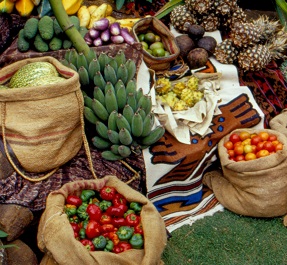 Permaculture is an ethical and sustainable approach to providing our human needs. It recognises human requirements such as food, fuel and shelter and attempts to supply them without degrading anything else in the environment such as air, water, animals, plants and soil.
Permaculture is an ethical and sustainable approach to providing our human needs. It recognises human requirements such as food, fuel and shelter and attempts to supply them without degrading anything else in the environment such as air, water, animals, plants and soil.
In a broad sense permaculture attempts to establish diverse environments which are productive, stable and resilient in order to provide people with food, shelter, energy, income and to build communities in a healthy, balanced, sustainable and integrated way.
As such, permaculture stresses both a positive approach and an attitude of cooperation, with respect to the environment and all living things. It embraces the ethic that all life has an intrinsic worth regardless of how useful an organism is to us as humans – and uses that as a basis for the three main ethical principles as follows:
- "Caring for the Earth" - all the living things (animals & plants) and the systems they live in (land, water and air) which make-up the environment should be allowed to prosper.
- "Caring for People" - permaculture systems are designed to encourage the promotion of self-reliance along with community responsibility.
- “Sharing Fairly” – follows the above two aims by limiting consumption, reproduction and sharing surplus by redistributing excess (e.g. food, labour, information or money).